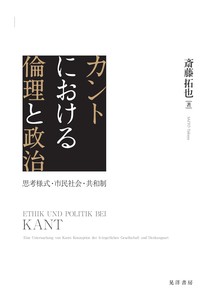
Title
Kanto ni okeru Rinri to Seiji (Immanuel Kant, Ethics and Politics - Way of Thinking, Civil Society and Republic)
Size
364 pages, A5 format
Language
Japanese
Released
July 30, 2019
ISBN
9784771032286
Published by
Koyo Shobo
Book Info
See Book Availability at Library
Japanese Page
How did Kant conceptualize political philosophy? Post the 1980s, especially, a lot of high-quality research took place in German-speaking and English-speaking countries which discussed law and politics focusing on Kant’s Liberalism, Enlightenment, and his concept of reform toward a Republic. In recent years, the number of outstanding works in Japanese in this field has been increasing.
At the outset of writing the doctoral dissertation on which this book is based, I wanted to focus on Kant’s defense of the idea of Republic as the just political institution in 18th-century Prussian monarchical society and clarify his conception of political reform that would gradually make it a real system. However, in the process of carrying out further research, my interest in locating where the energy to start and continue such reforms lies took root and grew, turning this into a study of individual agents and society in Kant’s theory—from the viewpoints of both political institutions and moral philosophy.
A feature of this book is that it expresses the gradual reform toward a Republic not simply as the reform “from the above”, i.e. by the monarch, but also from the “civil society” viewpoint. There is no doubt that Kant thought that the initiative of the monarch—the head of the state of the time—was essential in the process of political reform that would eventually realize basic rights, such as freedom, equality, and voting right. At the same time, the rational ideas that the citizens who will bear these rights and sovereignty ought to hold for their own society—Kant conceptualizes these as “original contract” and “way of thinking (Denkungsart)”—are no less important than institutional reform.
The first part of this book clarifies the difficulty in establishing the “way of thinking,” which represents a firm moral frame of mind and is a part of moral autonomy, a concept central to Kant’s moral philosophy, from the perspective of individual agents and society. “Way of thinking” is difficult to establish since humans contain both original predisposition to good as well as the radical evil, and according to Kant, individuals in the state of nature will end up at the state of war of everyone against everyone else.
The second part discusses in detail how Kant saw the escape from the state of nature and avoidance of evil as a challenge not just for individual agents but also for civil society and believed that the problem ought to be solved by reforming the existing political commonwealth (state) and ethical commonwealth (church). It is important for the people in civil society to explore a structure different from the existing problem-ridden system of rule of the church and state through the enlightenment.
The third part clarifies Kant’s viewpoint that reform toward a Republic is promoted not only by the monarch but also partly supported by different agents (politicians, academics, and citizens) whose way of thinking respects the rational idea of the original contract (social contract). From this perspective, we can understand that reform toward a Republic, as is frequently emphasized, is not only the process of destroying despotic rule and creating civil liberties but also one that builds an equal civil society by dismantling the hereditary nobility.
This book tries to express the idea of Kant’s Republic beyond the theory of political institutional reform. It might be a difficult read, but I hope young people with an interest in moral and political philosophy will pick it up.
(Written by: SAITO Takuya / October 28, 2020)



